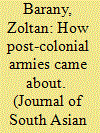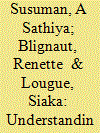|
|
|
Sort Order |
|
|
|
Items / Page
|
|
|
|
|
|
|
| Srl | Item |
| 1 |
ID:
134242


|
|
|
|
|
| Summary/Abstract |
This paper analyzes the change in the composition of the North Korean elite from 1997–2010. It examines 256 public appearances by Kim Jong Il that were reported as an ‘inspection,’ ‘field guidance’ or ‘on-the-spot guidance’ visits. In particular, the paper examines 30 mentioned individuals who accompanied Kim Jong Il at least five times from 1997 to 2010 on these inspection tours. It finds that there was a great deal of volatility and change from 1999–2004 followed by a period of stability. Further, there was a shift away from a conservative perspective to a more moderate and pragmatic perspective surrounding the ‘Dear Leader.’ This has continued under the current leader, Kim Jong Un. The implications of this shift are discussed.
|
|
|
|
|
|
|
|
|
|
|
|
|
|
|
|
| 2 |
ID:
134245


|
|
|
|
|
| Summary/Abstract |
The right to life is inherently connected with the right to food which implies that any foodstuff be nutritious and safe. The government of Bangladesh bears binding obligations to protect these rights under both international human rights instruments and its national constitution. The violation of these rights has, nonetheless, been commonplace causing numerous human deaths and terminal diseases. The perpetrators have been adulterating foods, flouting laws with impunity and taking advantage of regulatory impotence and governmental lenience for decades. Laws exist in books, regulators subsist in theory, but consumers die without remedies. This situation must not prevail forever as every human has an inherent right to live until their natural demise. This article aims to explore the binding obligations of the government to prevent food adulteration and to protect people’s essential rights. It highlights that numerous laws exist almost invisibly in the country, and recommends that their enforcement be reinforced in order to protect the people who are exposed to the overly contaminated food markets in Bangladesh.
|
|
|
|
|
|
|
|
|
|
|
|
|
|
|
|
| 3 |
ID:
134235


|
|
|
|
|
| Summary/Abstract |
In the early 1970s in South Africa two developments coincided. Workers in the port city of Durban struck, triggering a union movement which was crucial in defeating apartheid and which remains the society’s largest organized force. And radical scholars began to analyse apartheid as a system of class domination. The two were related, for the scholarship helped convince middle-class radicals to join the union movement. It also made democracy and a critique of private economic power key themes for the movement. The relationship between the ideas and the movement show the limits and possibilities of academic influence on social movements.
|
|
|
|
|
|
|
|
|
|
|
|
|
|
|
|
| 4 |
ID:
134244


|
|
|
|
|
| Summary/Abstract |
The creation of an army loyal to the state is one of the most important institutional tasks of post-colonial leaders. But how do novice political leaders develop the capacity to subordinate the armed forces to the authority of state institutions? This essay explains alternative methods of formulating post-colonial civil–military relations and explains why four states – India, Pakistan, Ghana, and Tanzania – took such different routes of institutional development. I make two arguments. Firstly, building armed forces that willingly acquiesce to state authority is always a critical issue of regime change – whether to democracy or some other form of government – though it is more difficult to accomplish in some contexts than others. Secondly, the political and socioeconomic contexts in which armies must be built are very different and thus pose dissimilar challenges and tasks to those crafting new armies and civil–military relations. I will assess the power of several variables to explain the disparate outcomes of the four cases: the quality of political leadership and leaders’ approach to the armed forces, the strength of political institutions, ethno-religious and regional policies, civilian control mechanisms, military–societal relations, and foreign influence.
|
|
|
|
|
|
|
|
|
|
|
|
|
|
|
|
| 5 |
ID:
134236


|
|
|
|
|
| Summary/Abstract |
The North American scholarship on gated housing communities posits the desire for security as the main driver for gating, but does this hold true for less wealthy countries? To address this question, this study examines evidence of why people live behind gates in Malaysia and Ghana and investigates the socio-economic implications of gating. It uses a critical institutional framework anchored on Foucault’s interpretation of ‘panopticon’ and Runciman’s theory of relative deprivation, while drawing empirical evidence from surveys and emic experiences. It finds that, while security is an important reason, it is the provision of quality housing services that is reported as the single most important reason for living behind gates. ‘Quality service’ is, however, shorthand for a preference for privileged status. Further, the paper reveals that it is more helpful to see the binary between quality and security as constituting a flexible continuum of motives. Inhabitants of gated housing communities may be primarily motivated by quality service or prestige. Yet, as they set themselves up against the rest of society by enclosing themselves in walls of affluence, they begin to feel a need for greater security. This feeling of insecurity is heightened as people outside the gates feel relatively deprived. Thus, the desire for security becomes illusory and attainment of privilege, pyrrhic, while the harsh socio-economic conditions for a large stratum of the urban population living outside the gates persist and are sometimes worsened.
|
|
|
|
|
|
|
|
|
|
|
|
|
|
|
|
| 6 |
ID:
134243


|
|
|
|
|
| Summary/Abstract |
In this article the focus is on law that governs the transfer of academic employees in Swaziland. A literature study of relevant law sources brought a lack of higher education law that regulates the transfer of academic employees during a merger to light. It is this problem that the authors aimed to address in this article. The authors, in an attempt to provide a legal framework for the transfer of academic employees, considered general labour law and case law. The transfer of academics during the merger of three colleges into a private university in 2010 was studied as a practical example. The contribution of this article is that it provides information to higher education institutions in Swaziland who are contemplating merging, the legislature and policymakers who have to adopt law and policy exclusively regulating the transfer of employees in the higher education sphere and academic employees who may become transferees during future mergers.
|
|
|
|
|
|
|
|
|
|
|
|
|
|
|
|
| 7 |
ID:
134241


|
|
|
|
|
| Summary/Abstract |
The problem of disabilities is growing all over the world. Nevertheless, some progress has been made since the year 1981 was proclaimed International Year of Disabled Persons. In 2001 people living with disabilities accounted for 5% of the South African population. Because of their disabilities or the perception society has regarding their potential, this population is mostly economically inactive. This study assesses the relationship between disabilities and the adverse socio-economic impacts. Both descriptive and logistics regression models are used to understand the problem by exploring the data of the 2006 South African General Household Survey. The overall people living with disabilities and aged 15–49 years is estimated at 1742 (961 males and 780 females), when exploring people with disabilities findings reveal that the Western Cape Province’s disabled are mostly affected by physical disabilities (40%). People living with disabilities are 3.5 times (p < 0.01) more likely to suffer from illness/injuries (flu, tuberculosis (TB) and severe cough, diarrhea, blood pressure and HIV/AIDS) than others. Therefore, the study aims to contribute to a better condition of people living with disabilities in South Africa by informing and possibly changing the public perception about them.
|
|
|
|
|
|
|
|
|
|
|
|
|
|
|
|
|
|
|
|
|